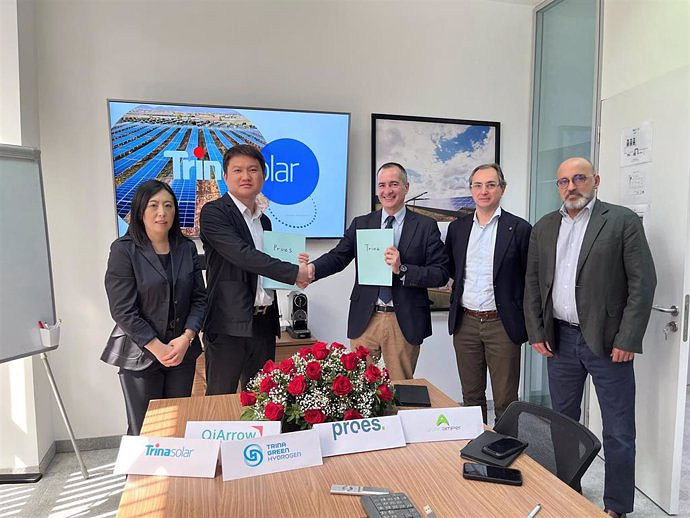BRUSELAS, 29 Sep. (EUROPA PRESS) -
An Advocate General of the European Union has recommended this Thursday the review of the calculation method used by the European Commission to set the amount of illegal aid that Spain must recover from the advantages it granted to shipyard investments for several years and that Brussels declared illegal in 2013.
The conclusions of Advocate General Pritt Pikamäe have considered that in relation to the method of calculating the aid, the previous judgment of the General Court "suffers from a reasoning defect", for which he considers that "it must be partially annulled".
Thus, the Advocate General has proposed to the Court of Justice that it "partially annul the Commission's Decision" to recover the aid and, more specifically, "as regards the calculation of the amount of the aid".
The opinions of the general advocates are not binding for the European Court of Justice, although the vast majority of sentences handed down follow the line marked by these opinions.
In its conclusions, Pikamäe has indicated that the General Court "limited itself to finding that the fact that the shipping companies were not the beneficiaries of the aid was not disputed" and to confirm the decision of Brussels to recover the aid only from the investors.
The case dates back to 2013, when Brussels asked the Spanish authorities to recover the illegal aid granted to shipyards under this system between 2007 and 2011, after concluding that the aid regime violates EU rules on public aid because it granted a selective advantage to its beneficiaries with respect to its competitors.
The Community Executive then established that the subsidies should be returned by the investors who financed the construction of the ships, but not the shipowners or the shipyards themselves.
In 2013, Spain, Lico Leasing and Pequenos y Medianos Astilleros Sociedad de Reconversión filed an annulment appeal against the Commission's decision whereby the EU General Court, in a ruling in 2015, annulled the decision, which in turn was annulled by the Court of Justice of the European Union, in 2018, after an appeal.
The high European court pointed out in its ruling that the General Court had incurred "an error of law" by basing its analysis on the erroneous premise that investors, and not economic interest groups, were the beneficiaries of tax advantages.
Within this framework, the CJEU ordered a review of the judgment that endorsed the Spanish system of tax credits ('tax lease') for investors in shipyards.
In his conclusions, the Advocate General has pointed out that the method used by the General Court to assess the selective nature of the Spanish tax leasing system "was correct" and that the granting of these "tax advantages" depended on the companies previously obtaining "authorization to practice early amortization".
Thus, Pikamäe has indicated that the Tax Administration could determine the beneficiaries of this early repayment or its conditions.
In addition, it has added that the "mere establishment of an aid system that confers a discretionary power on the Tax Administration regarding the choice of beneficiaries and the conditions for granting the aid", such as this tax lease system, could allow Member States to "disguise" the existence of "indirect beneficiaries and thus prevent part or all of the aid from being recovered from them".

 Exploring Cardano: Inner Workings and Advantages of this Cryptocurrency
Exploring Cardano: Inner Workings and Advantages of this Cryptocurrency Seville.- Economy.- Innova.- STSA inaugurates its new painting and sealing hangar in San Pablo, for 18 million
Seville.- Economy.- Innova.- STSA inaugurates its new painting and sealing hangar in San Pablo, for 18 million Innova.- More than 300 volunteers join the Andalucía Compromiso Digital network in one month to facilitate access to ICT
Innova.- More than 300 volunteers join the Andalucía Compromiso Digital network in one month to facilitate access to ICT Innova.-AMP.- Ayesa acquires 51% of Sadiel, which will create new technological engineering products and expand markets
Innova.-AMP.- Ayesa acquires 51% of Sadiel, which will create new technological engineering products and expand markets The AP calls the US veto to recognize Palestine as a full member of the UN "immoral"
The AP calls the US veto to recognize Palestine as a full member of the UN "immoral" The IAEA affirms that there is "no damage" to Iran's nuclear facilities after the attack attributed to Israel
The IAEA affirms that there is "no damage" to Iran's nuclear facilities after the attack attributed to Israel The Ibex 35 falls 0.8% at the opening and loses 10,700 points due to tensions in the Middle East
The Ibex 35 falls 0.8% at the opening and loses 10,700 points due to tensions in the Middle East Brent oil threatens to exceed $90 per barrel due to tensions in the Middle East
Brent oil threatens to exceed $90 per barrel due to tensions in the Middle East How Blockchain in being used to shape the future
How Blockchain in being used to shape the future Not just BTC and ETH: Here Are Some More Interesting Coins Worth Focusing on
Not just BTC and ETH: Here Are Some More Interesting Coins Worth Focusing on LIFE SPOT manages to develop new green treatments that eliminate groundwater contamination
LIFE SPOT manages to develop new green treatments that eliminate groundwater contamination València Game City is born to promote the video game industry and position this city as a leader in the sector
València Game City is born to promote the video game industry and position this city as a leader in the sector A team of UPV and iPRONICS manufactures the first programmable and multifunctional photonic chip on the market
A team of UPV and iPRONICS manufactures the first programmable and multifunctional photonic chip on the market 'Science and Reeds' returns with talks about "the mystery of the lost socks" or the vinegar fly
'Science and Reeds' returns with talks about "the mystery of the lost socks" or the vinegar fly A million people demonstrate in France against Macron's pension reform
A million people demonstrate in France against Macron's pension reform Russia launches several missiles against "critical infrastructure" in the city of Zaporizhia
Russia launches several missiles against "critical infrastructure" in the city of Zaporizhia A "procession" remembers the dead of the Calabria shipwreck as bodies continue to wash up on the shore
A "procession" remembers the dead of the Calabria shipwreck as bodies continue to wash up on the shore Prison sentences handed down for three prominent Hong Kong pro-democracy activists
Prison sentences handed down for three prominent Hong Kong pro-democracy activists ETH continues to leave trading platforms, Ethereum balance on exchanges lowest in 3 years
ETH continues to leave trading platforms, Ethereum balance on exchanges lowest in 3 years Investors invest $450 million in Consensys, Ethereum incubator now valued at $7 billion
Investors invest $450 million in Consensys, Ethereum incubator now valued at $7 billion Alchemy Integrates Ethereum L2 Product Starknet to Enhance Web3 Scalability at a Price 100x Lower Than L1 Fees
Alchemy Integrates Ethereum L2 Product Starknet to Enhance Web3 Scalability at a Price 100x Lower Than L1 Fees Mining Report: Bitcoin's Electricity Consumption Declines by 25% in Q1 2022
Mining Report: Bitcoin's Electricity Consumption Declines by 25% in Q1 2022 Oil-to-Bitcoin Mining Firm Crusoe Energy Systems Raised $505 Million
Oil-to-Bitcoin Mining Firm Crusoe Energy Systems Raised $505 Million Microbt reveals the latest Bitcoin mining rigs -- Machines produce up to 126 TH/s with custom 5nm chip design
Microbt reveals the latest Bitcoin mining rigs -- Machines produce up to 126 TH/s with custom 5nm chip design Bitcoin's Mining Difficulty Hits a Lifetime High, With More Than 90% of BTC Supply Issued
Bitcoin's Mining Difficulty Hits a Lifetime High, With More Than 90% of BTC Supply Issued The Biggest Movers are Near, EOS, and RUNE during Friday's Selloff
The Biggest Movers are Near, EOS, and RUNE during Friday's Selloff Global Markets Spooked by a Hawkish Fed and Covid, Stocks and Crypto Gain After Musk Buys Twitter
Global Markets Spooked by a Hawkish Fed and Covid, Stocks and Crypto Gain After Musk Buys Twitter Bitso to offset carbon emissions from the Trading Platform's ERC20, ETH, and BTC Transactions
Bitso to offset carbon emissions from the Trading Platform's ERC20, ETH, and BTC Transactions Draftkings Announces 2022 College Hoops NFT Selection for March Madness
Draftkings Announces 2022 College Hoops NFT Selection for March Madness

























